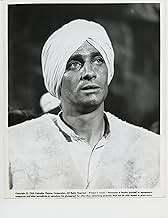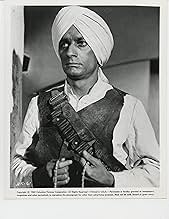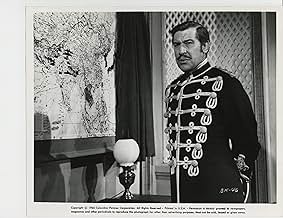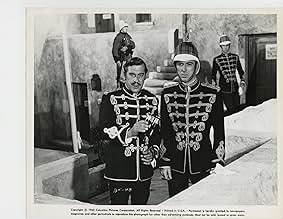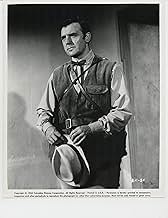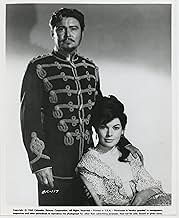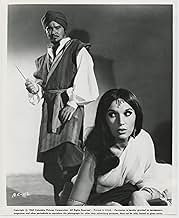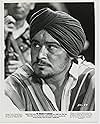The British army fights off rampaging locals in 1850s India.The British army fights off rampaging locals in 1850s India.The British army fights off rampaging locals in 1850s India.
- Elsa Connelly
- (as Catherine Woodville)
- Nasty Jailer
- (uncredited)
- Soldier in Shoot-out
- (uncredited)
- Director
- Writer
- All cast & crew
- Production, box office & more at IMDbPro
Featured reviews
The story is cheap and carries some distinctly colonial racial overtones, not least in the presence of anti-hero Ronald Lewis, blacked-up as a half-caste for his role. Lewis must be the singular most obnoxious heroic character in a Hammer film, a guy who I actually despised throughout much of the running time; were we really supposed to feel sorry for him after he swapped allegiances like that?
Elsewhere, it's sub-ZULU antics throughout, enlivened by a handful of larger-scale battle sequences which employ some dodgy back projection which saps them of realism. Once again Hammer has an eye for a distinguished supporting cast, but most of them are wasted here; the only ones who come out of it well are Duncan Lamont and Katherine Woodville. Oliver Reed is cast as the bad guy but I feel he would have made a much more compelling protagonist. In any case, this is as dull as dishwater and one of Hammer's weakest efforts.
More troubling than the film's skimpy budget, however, is the casting of its main character. He's supposed to be half-English, half-Indian -- one of those chaps who's worked his way up in the ranks of the British Army but who feels he's still regarded with hostility and suspicion by his colleagues. Not only does Ronald Lewis lack the face for this part, (there's nothing at all Indian about him), but he's also short of the darkly-compelling charisma which might make this character "work." He comes across as a provincial English actor who's dressed up in left-over garb from a production of "Kismet." In his defense, however, it must be said that the script gives him little to work with since his character is poorly developed and too often seems simply like the victim of events going on around him.
Oliver Reed might have been a better choice for the lead but here he plays the villain -- a rebellious chieftain who's said to be "half-mad." Unfortunately, this gives him license to indulge in some theatrical behavior which is more embarrassing than enlivening.
At one point a captured British soldier is whipped by the rebels but even this sure-fire scene is too poorly staged to arouse much interest. (Why didn't the rebels tear the soldier's shirt all the way off? Didn't they take Flogging 101?)
Had to laugh at the indignant shock of a couple of reviewers here expressing amazement that more Indians didn't feature in the cast. This is a Hammer production made in around 1964/65 and as such was made on the smell of an oily rag in England. For goodness sake, check out those vintage painted back drops of the castle in the mountains. There is absolutely no Indian location footage and in fact, footage was "borrowed" from a couple of other films to round out the battle scenes. Before we get all lathered up about the casting in a 55 year old "B" grade supporting feature, let's also remember that a bare 3 years before, it was perfectly acceptable for Alec Guinness to play an Arab in Lawrence of Arabia. In fact a couple of years after this, Lawrence Olivier played the Mahdi in Khartoum with little criticism.
As mentioned the only really stand-out feature of this film was the anti-colonial perspective of the British Raj. The villains of the piece were the senior British Officers who fitted up a fellow officer Case for a court-martial, because besides supposedly having "a touch of the tar brush", he had also had an affair with another officer's wife. He ends up running with the local rebel alliance, though their leader, Eli Khan (an hilariously black-faced Oliver Reed), is also depicted as being somewhat cruel and untrustworthy.
It all ends up in a gloriously romantic tragedy of near -Shakespearean proportions, as bodies litter a paper-mache cave hideout and accusing fingers are afterwards pointing in the British establishment direction. Cue the casting credits for this little oddity. I'm sure the production only ever had pretensions to being a support feature, but I give it a 5 for trying something a little different with the story line.
Did you know
- TriviaGlyn Houston says in his memoirs, whilst shooting a fight scene, he was injured by a stuntman who hit him over the head with a rifle.
- GoofsDuring a skirmish at the 40-min mark, a brigand signals a British soldier to jump back before attacking him.
- Quotes
Captain Boyd: Nearly a week ago, I presented you with an ultimatum. I'm still waiting for your answer.
Elsa: I've thought about your ultimatum, Captain Boyd. I intend to convey it to Robert Case on his return.
Captain Boyd: That should be at any moment. You've made a wise decision.
Elsa: You leave me with no alternative, of course. Why are you so vindictive?
Elsa: I don't like wives who cheat. Especially with half-castes. And I don't like half-castes who masquerade as officers.
Elsa: I suggest you complain to the War Office who appoint them.
Captain Boyd: Your behaviour has made that quite unnecessary - in this instance, at any rate.
Captain Boyd: It's ironical that your husband should volunteer for special mission with your lover, don't you think?
- Crazy creditsOpening credits prologue: FORT KANDAHAR A British outpost on the North West frontier of India 1850.
- ConnectionsFeatures Zarak (1956)
Details
- Release date
- Country of origin
- Languages
- Also known as
- Die Letzten von Fort Kandahar
- Filming locations
- Production company
- See more company credits at IMDbPro
- Runtime
- 1h 21m(81 min)
- Aspect ratio
- 2.35 : 1


